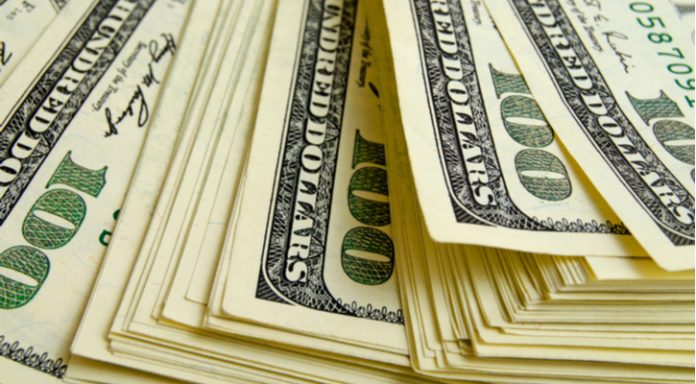A combination of pound strength and dollar weakness sent the pound US dollar exchange rate to its highest level in almost 2 weeks on Tuesday. The pair jumped over 0.7%, the biggest daily increase in a month, to hit a high of US$1.2908.
| What do these figures mean? |
|---|
|
When measuring the value of a pair of currencies, one set equals 1 unit and the other shows the current equivalent. As the market moves, the amount will vary from minute to minute. For example, it could be written: 1 GBP = 1.28934 USD Here, £1 is equivalent to approximately $1.29. This specifically measures the pound’s worth against the dollar. If the US dollar amount increases in this pairing, it’s positive for the pound. Or, if you were looking at it the other way around: 1 USD = 0.77786 GBP In this example, $1 is equivalent to approximately £0.78. This measures the US dollar’s worth versus the British pound. If the sterling number gets larger, it’s good news for the dollar. |
The pound soared higher in the previous session after data showed that the UK government surplus reached an 18-year high. Reduced government borrowing and an increase in tax receipts meant that the UK Treasury department collected £2.2 billion more than it spent during the month. This is significantly higher than the £1 billion surplus that city analysts were forecasting.
Whilst temporary factors played a role is lifting the surplus, the fact that total tax receipts were up 4.5% suggests that there are also some more permanent improvements in public finances. Furthermore, this big surplus means that UK Chancellor Philip Hammond, will have more money in the coffers for spending in the Autumn Budget, before Brexit.
| Why does strong economic data boost a country’s currency? |
|---|
| Solid economic indicators point to a strong economy. Strong economies have strong currencies because institutions look to invest in countries where growth prospects are high. These institutions require local currency to invest in the country, thus increasing demand and pushing up the money’s worth. So, when a country or region has good economic news, the value of the currency tends to rise. |
Encouraging headlines from Brexit talks between UK Brexit Secretary Dominic Raab and EU Chief Brexit Negotiator Michel Barnier also supported the pound. The talks are entering the final stages and both sides are hopeful that a deal will be in place well before the end of the year. As fears of a no deal Brexit receded, the pound rallied.
Dollar Lower on Trump’s Comments
The dollar fell heavily across the board in the previous session, as combining factors made the dollar less attractive. Firstly, with US – China trade talks beginning today, trade tensions have eased, reducing the demand for “safer” currencies such as the dollar.
Secondly, Trump talking down the dollar. The President made comments at the beginning of the week that he was “not thrilled” by the Fed hiking interest rates this year.
Finally, US political risk in on the increase after President Trump’s former lawyer pleaded guilty to federal charges and Trump’s campaign chairman is also convicted on 8 charges. With two close associates as felons, the fear is that information could surface linked to Trump.
Today investors will look to the release of the FOMC minutes. The minutes are from a meeting at the end of July where the Fed, as analysts expected, did not hike interest rates. Analysts are expecting the minutes to be hawkish and to show the Fed keen to raise interest rate twice more across this year. Should this be the case, the dollar could move higher.
| Why do raised interest rates boost a currency’s value? |
|---|
| Interest rates are key to understanding exchange rate movements. Those who have large sums of money to invest want the highest return on their investments. Higher interest rate environments tend to offer higher yields. So, if the interest rate or at least the interest rate expectation of a country is relatively higher compared to another, then it attracts more foreign capital investment. Large corporations and investors need local currency to invest. More local currency used then boosts the demand of that currency, pushing the value higher. |
This publication is provided for general information purposes only and is not intended to cover every aspect of the topics with which it deals. It is not intended to amount to advice on which you should rely. You must obtain professional or specialist advice before taking, or refraining from, any action on the basis of the content in this publication. The information in this publication does not constitute legal, tax or other professional advice from TransferWise Inc., Currency Live or its affiliates. Prior results do not guarantee a similar outcome. We make no representations, warranties or guarantees, whether express or implied, that the content in the publication is accurate, complete or up to date. Consult our risk warning page for more details.
This article was initially published on TransferWise.com from the same author. The content at Currency Live is the sole opinion of the authors and in no way reflects the views of TransferWise Inc.





